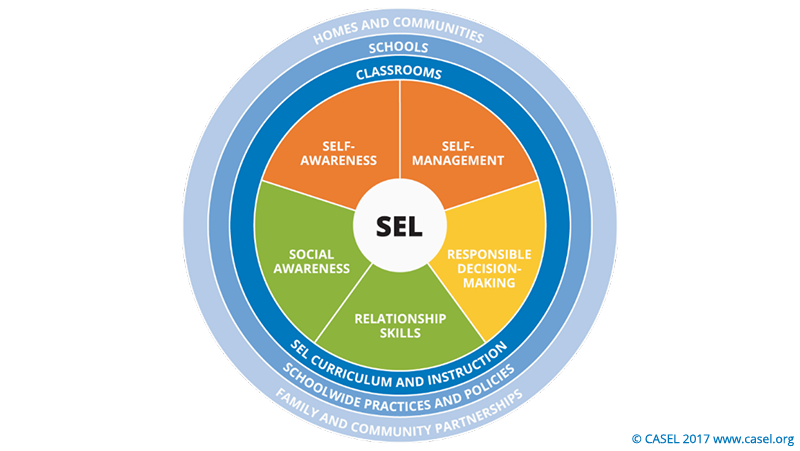Multi-Tiered System of Supports (MTSS) is an umbrella framework that includes Response to Intervention (RTI) and Positive Behavioral Intervention and Supports (PBIS). MTSS is a “process of systematically documenting the performance of students as evidence of the need for additional services after making changes in classroom behavioral instruction.”
The MTSS process is implemented through three components with Positive Behavior Intervention and Supports (PBIS) being the center and the core of the behavior programming. Social and Emotional Learning (SEL) and Restorative practices are integrated along with PBIS.
Social and emotional learning is the process through which children and adults acquire and effectively apply the knowledge, attitudes, and skills necessary to understand and manage emotions, set and achieve positive goals, feel and show empathy for others, establish and maintain positive relationships, and make responsible decisions.

What is PBIS?
School-wide Positive Behavioral Interventions & Supports (PBIS) is a proactive, team-based framework for creating and sustaining safe and effective schools. The focus of PBIS is to prevent problem behavior, develop pro-social skills, and use data-based problem solving for addressing existing behavior concerns. School-wide PBIS will help schools educate all students with the use of research-based, school-wide classroom, and individualized interventions. (MDE Guide, p. vii)
School-wide PBIS provides a comprehensive framework that can be used by any school to design their own system of behavioral supports for all students. It also provides informed decision making, based upon data analysis that guides the process of assessing student needs and providing additional levels of behavioral support to students in need. School-wide PBIS provides a positive focus to encouraging desirable student behaviors. A set of universal expectations for behavior, positively stated, are established for all students in all locations of the school. These expectations generally promote core values such as respect, responsibility, and safety. Interventions and strategies are implemented to teach and reinforce these expectations. (MDE Guide, p. 2)
What needs can PBIS address?
Implementing PBIS will increase time for instruction and decrease disciplinary incidents. PBIS addresses the behavioral needs of all students with proven, easy to implement strategies and helps to create a positive school climate.
What are the goals and primary student outcomes of PBIS?
PBIS is a skill-building approach that will strengthen social skills for any student. Positive interventions such as PBIS that support adaptive and pro-social behavior and build on the strengths of the student lead to an improved learning environment. Students are offered methods that help them learn and maintain appropriate behavior and discourage violation of codes of student conduct.
Effective secondary interventions produce measurable changes in behavior and improvements in a student's quality of life (e.g., participation in integrated activities, improved social relationships, independence and self-sufficiency).
Material adapted from Amstutz, L., & Mullet, J., (2005), pg 29-32.The Little Book of Restorative Discipline, pg 26-28 Wachtel & Costello (2009), The Restorative Practices Handbook, International Institute for Restorative Practices, pg 50
If you have any questions about Positive Behavior Intervention and Supports at Kenowa Hills Public Schools, please contact:
Luke Scholten, Director of Student Services
KH Early Childhood Center
3971 Richmond Ct NW | Grand Rapids, MI 49534
lscholten@khps.org | 616-647-0910 Ext: 3204

Nothing is more precious than your children. Find out how we work to ensure students feel safe, valued, and that they belong.
Safety and Security Commitment to Anti-Bullying Creating Inclusive Environments Safety DrillsLife is busy. At Kenowa Hills, we partner with families to make life easier.
TRANSPORTATION BEFORE AND AFTER SCHOOL CAREOur Personal Mastery educational experience has redefined education and has gained attention around the state and nation. Personal Mastery provides your child with personalized attention from teachers. Instead of teaching to a broad group of students without an understanding of their individual strengths and weaknesses, Personal Mastery allows teachers to interact with students individually or in small groups to help them better address their weaknesses. In this way, we strive to help your child reach their full potential.
PERSONAL MASTERY SPECIAL EDUCATION ENGLISH LEARNERS TECHNOLOGY IN THE CLASSROOMAt the home of the Knights, athletic programs are a vital part of building character, drive, commitment, and teamwork for our student athletes.
UP-TO-DATE SPORTS INFO ATHLETIC DEPARTMENT YOUTH SPORTS Athletic BoostersThe arts build pride and community at Kenowa Hills. From our Marching Knights to musical performances at our Performing Arts Center, we believe the student experience really is a work of art.
FINE ART PROGRAMS PERFORMING ARTS CENTER